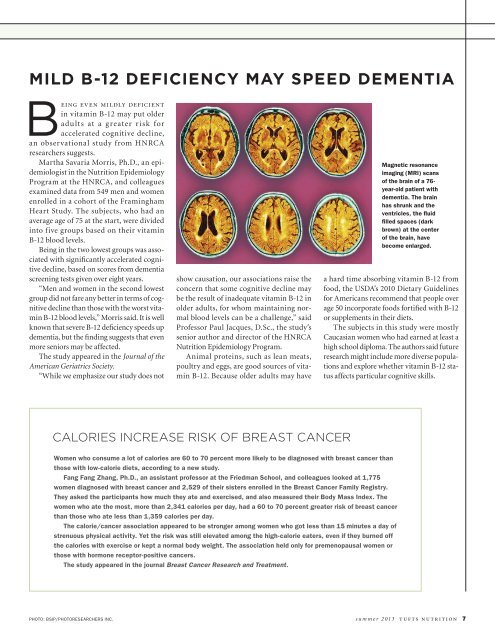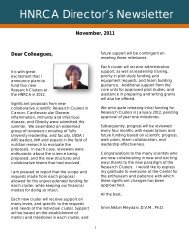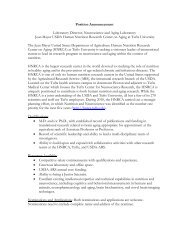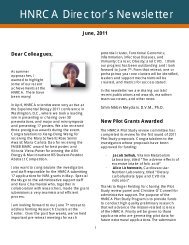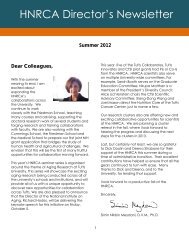Microbiome - Human Nutrition Research Center on Aging - Tufts ...
Microbiome - Human Nutrition Research Center on Aging - Tufts ...
Microbiome - Human Nutrition Research Center on Aging - Tufts ...
You also want an ePaper? Increase the reach of your titles
YUMPU automatically turns print PDFs into web optimized ePapers that Google loves.
MILD B-12 DEFICIENCY MAY SPEED DEMENTIA<br />
eing even mildly deficient<br />
in vitamin B-12 may put older<br />
adults at a greater risk for<br />
accelerated cognitive decline,<br />
an observati<strong>on</strong>al study from HNRCA<br />
researchers suggests.<br />
Martha Savaria Morris, Ph.D., an epidemiologist<br />
in the <str<strong>on</strong>g>Nutriti<strong>on</strong></str<strong>on</strong>g> Epidemiology<br />
Program at the HNRCA, and colleagues<br />
examined data from 549 men and women<br />
enrolled in a cohort of the Framingham<br />
Heart Study. The subjects, who had an<br />
average age of 75 at the start, were divided<br />
into five groups based <strong>on</strong> their vitamin<br />
B-12 blood levels.<br />
Being in the two lowest groups was associated<br />
with significantly accelerated cognitive<br />
decline, based <strong>on</strong> scores from dementia<br />
screening tests given over eight years.<br />
“Men and women in the sec<strong>on</strong>d lowest<br />
group did not fare any better in terms of cognitive<br />
decline than those with the worst vitamin<br />
B-12 blood levels,” Morris said. It is well<br />
known that severe B-12 deficiency speeds up<br />
dementia, but the finding suggests that even<br />
more seniors may be affected.<br />
The study appeared in the Journal of the<br />
American Geriatrics Society.<br />
“While we emphasize our study does not<br />
show causati<strong>on</strong>, our associati<strong>on</strong>s raise the<br />
c<strong>on</strong>cern that some cognitive decline may<br />
be the result of inadequate vitamin B-12 in<br />
older adults, for whom maintaining normal<br />
blood levels can be a challenge,” said<br />
Professor Paul Jacques, D.Sc., the study’s<br />
senior author and director of the HNRCA<br />
<str<strong>on</strong>g>Nutriti<strong>on</strong></str<strong>on</strong>g> Epidemiology Program.<br />
Animal proteins, such as lean meats,<br />
poultry and eggs, are good sources of vitamin<br />
B-12. Because older adults may have<br />
Magnetic res<strong>on</strong>ance<br />
imaging (MRI) scans<br />
of the brain of a 76-<br />
year-old patient with<br />
dementia. The brain<br />
has shrunk and the<br />
ventricles, the fluid<br />
filled spaces (dark<br />
brown) at the center<br />
of the brain, have<br />
become enlarged.<br />
a hard time absorbing vitamin B-12 from<br />
food, the USDAʼs 2010 Dietary Guidelines<br />
for Americans recommend that people over<br />
age 50 incorporate foods fortified with B-12<br />
or supplements in their diets.<br />
The subjects in this study were mostly<br />
Caucasian women who had earned at least a<br />
high school diploma. The authors said future<br />
research might include more diverse populati<strong>on</strong>s<br />
and explore whether vitamin B-12 status<br />
affects particular cognitive skills.<br />
CALORIES INCREASE RISK OF BREAST CANCER<br />
Women who c<strong>on</strong>sume a lot of calories are 60 to 70 percent more likely to be diagnosed with breast cancer than<br />
those with low-calorie diets, according to a new study.<br />
Fang Fang Zhang, Ph.D., an assistant professor at the Friedman School, and colleagues looked at 1,775<br />
women diagnosed with breast cancer and 2,529 of their sisters enrolled in the Breast Cancer Family Registry.<br />
They asked the participants how much they ate and exercised, and also measured their Body Mass Index. The<br />
women who ate the most, more than 2,341 calories per day, had a 60 to 70 percent greater risk of breast cancer<br />
than those who ate less than 1,359 calories per day.<br />
The calorie/cancer associati<strong>on</strong> appeared to be str<strong>on</strong>ger am<strong>on</strong>g women who got less than 15 minutes a day of<br />
strenuous physical activity. Yet the risk was still elevated am<strong>on</strong>g the high-calorie eaters, even if they burned off<br />
the calories with exercise or kept a normal body weight. The associati<strong>on</strong> held <strong>on</strong>ly for premenopausal women or<br />
those with horm<strong>on</strong>e receptor-positive cancers.<br />
The study appeared in the journal Breast Cancer <str<strong>on</strong>g>Research</str<strong>on</strong>g> and Treatment.<br />
PHOTO: BSIP/PHOTORESEARCHERS INC.<br />
summer 2013 tufts nutriti<strong>on</strong> 7


